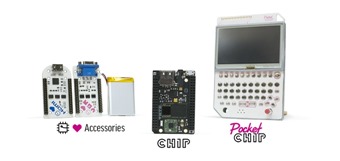 We’ve seen our share of rock-bottom-priced computers in the last few years—the Arduino, the Raspberry Pi, Rhombus Tech. But a Kickstarter project due to end in just under two days may have them all beat. Touting itself as “the world’s first $9 computer,” the CHIP system-on-a-chip packs a fully-powered 1 GHz, 512 megabyte RAM, 4 gigabyte storage computer into a card the size of a movie ticket. It includes Bluetooth for hooking up to controllers and peripherals, comes with Linux pre-installed, and has uses including web browsing, using LibreOffice, playing games, playing music, or even learning to code.
We’ve seen our share of rock-bottom-priced computers in the last few years—the Arduino, the Raspberry Pi, Rhombus Tech. But a Kickstarter project due to end in just under two days may have them all beat. Touting itself as “the world’s first $9 computer,” the CHIP system-on-a-chip packs a fully-powered 1 GHz, 512 megabyte RAM, 4 gigabyte storage computer into a card the size of a movie ticket. It includes Bluetooth for hooking up to controllers and peripherals, comes with Linux pre-installed, and has uses including web browsing, using LibreOffice, playing games, playing music, or even learning to code.
Apparently people like what they see, because this project has far surpassed its $50,000 goal. With 45 hours left to run in the Kickstarter, it’s racked up over $1,970,000 in pledges, and will undoubtedly pass $2 million by the time it closes.
In some ways, calling it a $9 computer is a little dishonest, because in order to make it really useful, you do need to add the VGA or HDMI adapter, which brings it up to $19 or $24—about the same price as the Raspberry Pi. (Otherwise, you can plug it into a standard composite video plug, as with a TV.) But for all of that, this little gizmo seems surprisingly versatile—not to mention tiny. You can use it plugged into a computer, or you can shell out $49 to get it with a little PDA-style case that includes a screen and a thumb keyboard. A $93 pledge includes the case, both adapters, and a battery pack for portable projects.
The project backers estimate they can fulfill the CHIP itself in December 2015, and the other gizmos in May 2016. It’s going to take the device a while to become widely available. But with those specs and that form factor, this could be just what the doctor ordered for getting e-reading and computer access into the hands of more people, especially financially-disadvantaged people.
Imagine the many beneficial uses for a $9 computer. Relief agencies could hand them out to the unemployed. “Here, plug this into your TV, write up your resume on the word processor, and get job-hunting.” Libaries could loan full-fledged computers out to their patrons, and not worry too much about the financial impact if they break or keep them. This might not entirely solve the digital divide, but it could chop a big hole in it. And it could be a “personal” computer in a way no computer has been before. Imagine popping open the back of your tablet or phone, popping out the CHIP, and plugging it into your TV or monitor when you get home.
There is the minor drawback that it runs Linux instead of Windows, in terms of the software most people use. But as many useful applications as have migrated to web browsers, operating systems have finally started to become unimportant in the way people have been predicting for years that they would. And there are plenty of great applications available for Linux—including the Calibre e-book manager and FBReader e-book reader.
Related: Paul St John Mackintosh’s earlier perspective on the same topic.
































